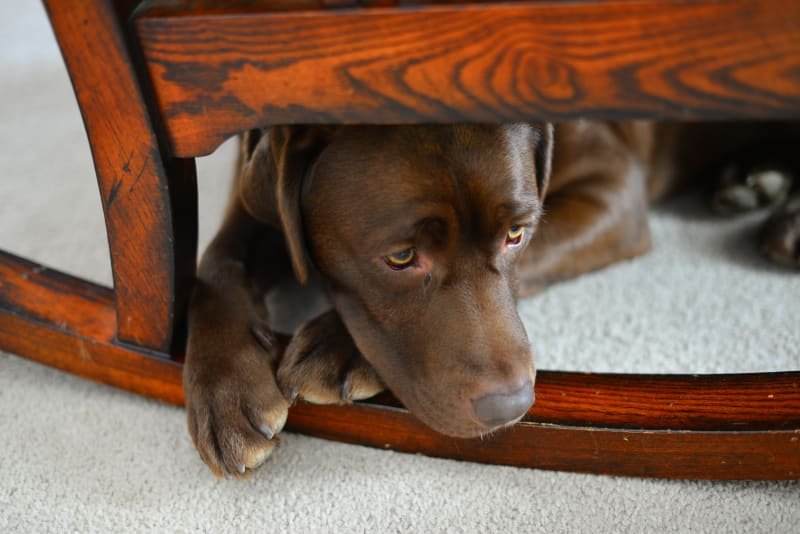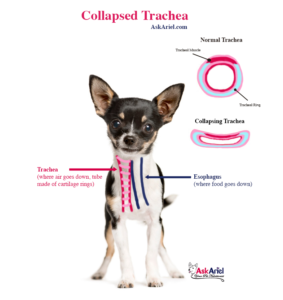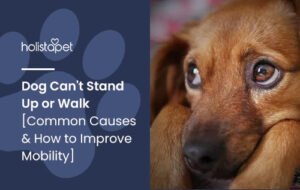Is your dog panting at night? This common behavior can be puzzling for many pet owners. So let’s dive in deep: Why is My Dog Panting at Night?
Dogs may pant for various reasons, especially during the night. It can be a sign of discomfort, stress, or even a medical issue. Understanding why your furry friend is panting is important. It helps ensure their health and happiness. Nighttime panting can disrupt sleep for both you and your dog.
It can lead to worry and confusion. Many factors contribute to this behavior, such as temperature, anxiety, or health conditions. By exploring these reasons, you can better care for your pet and address any concerns. Let’s dive into the possible causes of nighttime panting and what you can do about it.
Table of Contents
Introduction To Canine Nocturnal Panting
Many dog owners notice their pets panting at night. This behavior can be puzzling. Understanding why your dog pants can help you ensure their well-being. In this section, we will explore the reasons behind nocturnal panting.
Identifying Normal Vs. Abnormal Panting
Panting is a natural behavior for dogs. However, not all panting is the same. Here’s how to tell normal from abnormal panting:
| Panting Type | Characteristics | Action Required |
|---|---|---|
| Normal Panting |
|
No action needed |
| Abnormal Panting |
|
Consult a veterinarian |
Importance Of Monitoring Nighttime Behaviors
Monitoring your dog’s nighttime behavior is vital. Changes can indicate health issues or stress. Here are some signs to watch for:
- Panting without a clear reason.
- Frequent waking or pacing.
- Increased heart rate.
- Changes in eating or drinking habits.
Keeping a journal can help track these behaviors. Note when the panting occurs. This information is useful for your vet. Observing your dog’s habits ensures they remain healthy and happy.

Credit: www.montecitopethospital.com
Temperature Regulation In Dogs
Dogs have a unique way to keep cool. They use panting as a natural method for temperature regulation. Unlike humans, dogs do not sweat through their skin. They rely on their respiratory system instead. Understanding this process helps explain why your dog may be panting at night.
How Dogs Use Panting To Cool Down
Panting is a normal behavior for dogs. It helps them lower their body temperature. Here’s how it works:
- Increased breathing rate: Dogs breathe faster to exchange heat.
- Evaporation of moisture: Panting releases moisture from their tongues.
- Cooling blood flow: Air cools the blood as it passes through the lungs.
This method can be very effective. It helps dogs stay comfortable, especially in warm conditions. At night, if your dog is panting, it might be trying to cool down from daytime heat.
The Role Of The Environment In Nighttime Panting
Several environmental factors can cause nighttime panting. Consider these factors:
| Factor | Impact on Panting |
|---|---|
| Room temperature | High temperatures can cause excessive panting. |
| Humidity | High humidity makes it harder for dogs to cool down. |
| Bedding material | Some materials retain heat, causing discomfort. |
| Exercise level | More activity during the day leads to more panting at night. |
Be aware of your dog’s environment. Ensure it is cool and comfortable. This can help reduce nighttime panting. A fan or air conditioning can create a pleasant atmosphere. Proper bedding also helps your dog feel relaxed.
Stress And Anxiety Triggers
Dogs can feel stress and anxiety, especially at night. This can lead to panting. Understanding what triggers this stress helps owners help their pets. Let’s explore the signs of stress and common anxiety-inducing scenarios.
Recognizing Signs Of Stress In Your Pet
Dogs show stress in various ways. Look for these signs:
- Excessive panting
- Restlessness or pacing
- Whining or barking
- Hiding or seeking attention
- Destructive behavior
Each dog may react differently. Monitor your dog closely. Understanding their behavior is key to helping them feel safe.
Common Anxiety-inducing Scenarios At Night
Many situations can cause nighttime anxiety in dogs. Here are some common triggers:
| Trigger | Description |
|---|---|
| Noise | Loud sounds like thunder or fireworks can scare dogs. |
| Changes in routine | New schedules or late nights can unsettle pets. |
| Separation anxiety | Being alone can make some dogs feel anxious. |
| New environment | Moving to a new home can cause stress. |
| Health issues | Pain or discomfort can lead to panting at night. |
Identifying these triggers is important. Create a calm environment for your dog at night. Simple changes can help reduce their anxiety.

Credit: www.dutch.com
Medical Conditions Causing Excessive Panting
Panting at night can be normal. Yet, sometimes it signals a problem. Many medical conditions can cause dogs to pant excessively. Understanding these issues helps in caring for your furry friend.
Respiratory Issues And Panting
Respiratory problems can make your dog breathe harder. This leads to panting, especially at night. Common respiratory issues include:
- Asthma: Inflammation in the airways.
- Pneumonia: Infection in the lungs.
- Tracheal collapse: Weakening of the windpipe.
Look for signs like coughing or wheezing. These indicate serious respiratory distress. Seek veterinary help quickly.
Cardiac Problems That Lead To Panting
Heart issues can also cause excessive panting. The heart struggles to pump blood. This reduces oxygen flow. Some common cardiac problems are:
| Condition | Symptoms |
|---|---|
| Heartworm Disease | Coughing, fatigue, weight loss |
| Congestive Heart Failure | Shortness of breath, swelling in the abdomen |
| Arrhythmias | Weakness, fainting, rapid breathing |
Watch for signs like lethargy or blue gums. These require immediate attention. Cardiac problems can worsen quickly.
Panting Related To Pain And Discomfort
Panting in dogs can signal more than just heat or excitement. It may indicate pain or discomfort, especially at night. Understanding this behavior is crucial for pet owners. Recognizing the signs helps ensure your dog’s well-being.
Identifying Pain In Dogs Through Panting
Panting often accompanies signs of pain in dogs. Look for these symptoms:
- Restlessness: Pacing or unable to settle down.
- Whining: Vocalizing more than usual.
- Changes in posture: Hunched back or stiff movements.
- Reduced appetite: Eating less or ignoring food.
- Excessive licking: Focusing on a specific body part.
Watch for these signs along with panting. They may point to discomfort or pain. Timely observation can lead to quicker help.
Common Causes Of Pain Affecting Dogs At Night
Several issues can cause pain in dogs, leading to panting at night:
| Condition | Description |
|---|---|
| Arthritis | Joint pain from inflammation. Affects movement and comfort. |
| Injury | Physical harm from accidents or falls. Can be acute or chronic. |
| Digestive issues | Stomach problems may cause discomfort. Look for bloating. |
| Dental pain | Tooth problems can lead to discomfort. Watch for chewing changes. |
| Infections | Infections can cause pain. Look for fever or lethargy. |
Recognizing these conditions can guide your next steps. Consult a veterinarian for proper diagnosis and treatment.

Credit: www.dutch.com
The Impact Of Age On Nighttime Panting
As dogs age, their bodies change. Many owners notice their dogs panting at night. This behavior can be linked to age-related issues. Understanding these changes helps owners provide better care.
Considering Senior Dogs And Panting
Senior dogs often experience various physical changes. These changes can lead to increased panting at night.
- Less physical activity
- Changes in metabolism
- Joint pain and discomfort
Older dogs may have trouble regulating their body temperature. This can cause them to pant more at night. It’s important to monitor their behavior closely. Look for patterns that might indicate discomfort.
Age-related Diseases That Increase Panting
Certain diseases are more common in older dogs. These can cause increased panting at night:
| Disease | Description |
|---|---|
| Heart disease | Causes breathing issues and increased panting. |
| Lung problems | Restricts airflow, leading to panting. |
| Arthritis | Pain can cause stress and panting. |
| Cushing’s disease | Hormonal imbalance increases panting. |
Recognizing these signs is crucial. Consult a vet for proper diagnosis and treatment. Early intervention can help manage these conditions.
The Role Of Diet And Hydration
Diet and hydration play key roles in your dog’s health. What your dog eats and drinks affects its body. Poor diet or lack of water can lead to issues. One common problem is nighttime panting. Understanding these factors can help you manage your dog’s comfort.
Effects Of Overeating Before Bedtime
Feeding your dog too much food at night can cause panting. Here’s why:
- Heavy meals can lead to discomfort.
- Dogs may feel bloated after overeating.
- Digestion requires energy, raising body temperature.
Watch for these signs:
- Restlessness.
- Increased thirst.
- Unusual vocalizations.
To avoid these issues:
- Feed smaller meals in the evening.
- Set a regular feeding schedule.
- Limit treats close to bedtime.
Dehydration And Its Relation To Panting
Hydration is vital for your dog’s health. Dehydration can cause excessive panting.
Signs of dehydration include:
- Dry gums.
- Sunken eyes.
- Loss of skin elasticity.
Ensure your dog drinks enough water:
- Provide fresh water daily.
- Monitor water intake, especially in hot weather.
- Encourage drinking after meals and exercise.
Proper hydration helps regulate body temperature. This can reduce panting at night.
Managing Your Dog’s Nighttime Panting
Understanding your dog’s nighttime panting is important. It helps to create a peaceful sleep environment for both of you. Here are some tips for managing this issue.
Creating A Calming Environment
A calm space can help reduce your dog’s stress. Here are some ways to create a soothing atmosphere:
- Comfortable bed: Provide a soft and cozy dog bed.
- Quiet area: Choose a spot away from noise.
- Dim lighting: Use soft, low lights to relax.
- Consistent routine: Keep a regular schedule for feeding and walks.
- Soothing sounds: Play calming music or white noise.
Pay attention to your dog’s needs. Sometimes, a simple change can make a big difference.
When To Consult A Veterinarian
Sometimes, panting can signal health issues. Look for these signs:
- Panting lasts too long.
- Your dog seems restless or anxious.
- Signs of pain or discomfort.
- Changes in eating or drinking habits.
Don’t hesitate to reach out to your vet. Early intervention can help your dog feel better. Always trust your instincts about your dog’s health.
Frequently Asked Questions
Why Is My Dog Panting Excessively At Night?
Excessive panting at night can indicate various issues. It may signal anxiety, pain, or discomfort. Heat can also cause your dog to pant more. Ensure your dog is in a cool environment. If it persists, consult your veterinarian for a thorough examination.
Is Panting Normal For Dogs While Sleeping?
Light panting can be normal during sleep. Dogs often dream, which may cause brief panting. However, persistent or heavy panting might indicate a problem. Monitor your dog’s behavior and comfort levels. If you’re concerned, it’s best to seek veterinary advice.
What Are Common Causes Of Nighttime Panting?
Nighttime panting can arise from several factors. Anxiety, nightmares, or medical issues are common culprits. Allergies and heat can exacerbate this behavior too. Observe your dog’s overall health and environment. A veterinarian can help identify the underlying cause.
How Can I Help My Dog With Nighttime Panting?
To help your dog, create a calm environment. Use comfortable bedding and maintain a cool temperature. Engage in relaxing activities before bedtime. Ensure your dog gets regular exercise during the day. If panting continues, consult your vet for further guidance.
Conclusion
Panting at night can be concerning. It may signal stress, discomfort, or health issues. Always observe your dog’s behavior closely. A calm environment can help reduce anxiety. Regular vet check-ups are essential for your dog’s health. If panting persists, consult your veterinarian.
They can provide the best advice for your pet. Understanding your dog’s needs creates a stronger bond. Keep your furry friend safe and comfortable. Pay attention to changes in behavior. Your dog relies on you for care and support.



